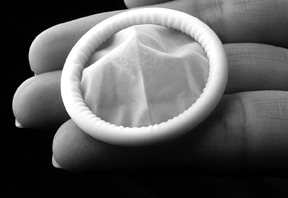







Recommmended Reading!

Pregnancy: Teen Decisions
The chart below compares some of the reversible contraceptives discussed in this guide. Each method is listed with its estimated "perfect use failure rate," that is, the percentage of pregnancies which occur if the method is used perfectly and consistently. The "actual failure rate," also listed below, is the percentage of pregnancies reported by typical users.
All of these figures are among couples using the specified method for one year. The columns in the center indicate how each method works, giving an idea of which mechanisms are employed as birth control. Failure rates for hormonal methods and the IUD tend to be lower because of interceptive mechanisms which take effect when fertilization is not prevented. On the right are indications as to STD protection and one year continuation rates for each method.
| FAILURE RATES | MECHANISM OF ACTION | STD |
USER |
||||
|---|---|---|---|---|---|---|---|
method of |
perfect use |
actual use |
prevents fertilization |
prevents implantation |
postpone sex |
protection | continuation rates |
No Method |
85 |
85 |
|
|
|
|
|
Spermicides |
6 |
26 |
++++ |
|
|
+ |
40 |
Male Condoms |
3 |
14 |
++++ |
|
|
++ |
61 |
Female Condoms |
5 |
21 |
++++ |
|
|
++ |
56 |
Diaphragm |
6 |
20 |
++++ |
|
|
+ |
56 |
Sponge |
6 |
20 |
++++ |
|
|
+ |
56 |
Cervical Cap |
9 |
20 |
++++ |
|
|
+ |
56 |
Cervical Cap or Sponge |
26 |
40 |
++++ |
|
|
+ |
42 |
Ovulation Method |
3 |
20 |
+++ |
|
+ |
|
63 |
Sympto-Thermal |
2 |
17 |
+++ |
|
+ |
|
63 |
Calendar Method |
5-9 |
13-20 |
+++ |
|
+ |
|
63 |
Lactation (LAM) |
0.5 |
6 |
++++ |
|
|
|
|
Withdrawal |
4 |
19 |
++++ |
|
|
+ |
|
Combined Oral Contraceptives |
0.1 |
5 |
+++ |
+ |
|
|
71 |
Mini-Pill (Progestin-Only) |
0.5 |
1-13 |
++ |
++ |
|
|
71 |
Norplant |
0.05 |
1-5 |
++ |
++ |
|
|
88 |
Depo-Provera |
0.3 |
- |
+++ |
+ |
|
|
59 |
IUD |
0.6-1.5 |
1-2 |
+ |
+++ |
|
|
80 |
Abstinence |
0 |
0 |
|
|
++++ |
+++ |
|
For added protection against pregnancy, you can use more than one method of contraception at a time. For example, many clinicians recommend that when using condoms, spermicides be used as well. If a woman is allergic to spermicides she can use a natural method and a condom and for extra protection. Any of these combinations will reduce the predicted failure rate.
RESPONSIBLE SEX AND STD'S
In a society where casual sex is presented as the norm it's easy to forget about the potential consequences of careless behavior. Although STD's may pose a health threat to everyone, be aware that women stand to lose much more from irresponsible sexual behavior than men. STD's wreak havoc on a woman's reproductive organs and may result in permanent infertility or even death. Teenage sexual activity and having multiple sex partners has been strongly linked to cervical cancer -- a condition that men don't need to worry about.
Many sexually transmitted diseases can be treated or cured by your doctor. If you notice any vaginal itching, burning, unusual discharge, blisters, or pain, you should visit your gynecologist right away. The symptoms of some STD's, like syphilis or herpes, may come and go. Other STD's, like gonorrhea or chlamydia, may have no noticeable symptoms whatsoever. Symptoms or not, STD's are dangerous if left untreated. Untreated chlamydia or gonorrhea can result in sterility and inflammation, and untreated syphilis can result in death. If you become pregnant, STD's can be passed on to your baby causing infant sickness or death.
Some STD's are incurable. Human immunodeficiency virus (HIV) infection will lead to AIDS and death. Human papillomavirus (HPV) can result in pain, genital warts, cancer, and death. Hepatitis B is also very serious. Herpes, though not fatal, is a lifelong menace.
 Condoms made
of latex or polyurethane
can help reduce the likelihood of STD's, but even these sometimes
allow the transmission of disease; 2-6% of condoms break or fall off
during intercourse, and a condom can break even if you use it
perfectly.
Spermicides containing nonoxinol-9 were
once thought to help prevent HIV infection, but newer studies
show an increased risk because the chemical can irritate the vagina,
facilitating infection. Consequently, spermicides are no longer
being recommended for HIV prevention. Many sexual activities aside
from intercourse can result in infection as well. Know your partner
and his sexual history. The only "safe sex" is lifelong
monogamy with an uninfected partner. (More on
Responsible Sexual Choices.)
Condoms made
of latex or polyurethane
can help reduce the likelihood of STD's, but even these sometimes
allow the transmission of disease; 2-6% of condoms break or fall off
during intercourse, and a condom can break even if you use it
perfectly.
Spermicides containing nonoxinol-9 were
once thought to help prevent HIV infection, but newer studies
show an increased risk because the chemical can irritate the vagina,
facilitating infection. Consequently, spermicides are no longer
being recommended for HIV prevention. Many sexual activities aside
from intercourse can result in infection as well. Know your partner
and his sexual history. The only "safe sex" is lifelong
monogamy with an uninfected partner. (More on
Responsible Sexual Choices.)
If there's any chance that your partner might be infected, suggest that he first be examined by a doctor. If he is unwilling to visit a doctor or discuss his sexual history, maybe you should ask yourself if you really want to have intercourse with him. 20% of men would lie about their HIV positive status just to get sex, so be careful. You have a right to know what you are getting into.
Never allow yourself to be pressured
into a sexual relationship. Never let a man coerce or bully you
into having intercourse with him. Don't be afraid to say no. If
he forces himself on you after you've said no, or if he takes
advantage of you while you're intoxicated, it is considered rape.
Your decision whether or not to become sexually active is something which should be taken very seriously -- you and your partner have the potential to create a new human life. Women often regret having gotten involved sexually with men they did not know well. If pregnancy results from such a relationship, some men will insist on an abortion or leave. Discuss the possibility of pregnancy with your partner beforehand. What would he do if you became pregnant? What would you do? If your partner is unreceptive to your concerns, chances are that he is not ready for the intimacy of a sexual relationship. Even in marriage, sexual fulfillment can only occur in an atmosphere of total self-giving, where no barriers exist between you and your partner.
 If you do decide to be sexually active,
keep in mind that all contraceptives have failed at some point.
Even if you use your method perfectly, there are no guarantees
-- it still might fail. If your method of contraception
has an average failure rate of 18%, over five years your likelihood
of pregnancy is greater than fifty percent. During those five
years, figure 63 out of 100 women using a diaphragm will have
gotten pregnant at least once. 20% of young women who become sexually
active become pregnant within the first month of sexual
activity. 50% become pregnant within the first six months.
The average woman using reversible contraception can expect two
unintended pregnancies in her lifetime, or more if she does not
always use her method. Even a low annual risk of contraceptive
failure implies a high risk of becoming pregnant during a lifetime of use.
If you do decide to be sexually active,
keep in mind that all contraceptives have failed at some point.
Even if you use your method perfectly, there are no guarantees
-- it still might fail. If your method of contraception
has an average failure rate of 18%, over five years your likelihood
of pregnancy is greater than fifty percent. During those five
years, figure 63 out of 100 women using a diaphragm will have
gotten pregnant at least once. 20% of young women who become sexually
active become pregnant within the first month of sexual
activity. 50% become pregnant within the first six months.
The average woman using reversible contraception can expect two
unintended pregnancies in her lifetime, or more if she does not
always use her method. Even a low annual risk of contraceptive
failure implies a high risk of becoming pregnant during a lifetime of use.
If it's imperative that pregnancy
be prevented, avoid sexual intercourse. Making love makes babies.
If you are sexually active you should be prepared if you become
pregnant.

If you discover that you are pregnant, seek prenatal care as soon as possible. Eat well-balanced meals; avoid dieting, as well as raw meat and unpasteurized products. Drink milk, water, and fruit juices rather than caffeinated beverages or soda. Avoid alcohol completely during pregnancy, as well as exposure to toxins like nicotine and illegal drugs. If you smoke, quit now! Obtain prenatal vitamins from your doctor, and talk to him or her before taking any over-the-counter drugs. Avoid any contact with kitty litter; your cat could be carrying toxoplasma, an infection that could harm your baby.
Avoid hot tubs, saunas, or exposure
to illness that could cause a fever. Exercise moderately, but
never to the point where your temperature becomes elevated. Avoid
STD exposure. Most of all, know the danger signs of pregnancy
complication, such as abdominal pain, vaginal bleeding, or fluid
discharge.


Crisis Pregnancies
If pregnancy is a problem, help is available. If you are in a difficult financial situation, there are several pregnancy help centers which can help to provide everything needed for you and your baby for as long as necessary. Contact your local pregnancy resource center. Experienced counselors are available for referrals or if you just need someone to talk to. Even if your partner is unsupportive, no woman has to go it alone.

Go to next section
Visitors Since 9-5-97.
Updated: December 7, 2002